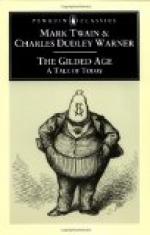“Why, Phil,” she would say, “what puts you in the dumps to day? You are as solemn as the upper bench in Meeting. I shall have to call Alice to raise your spirits; my presence seems to depress you.”
“It’s not your presence, but your absence when you are present,” began Philip, dolefully, with the idea that he was saying a rather deep thing. “But you won’t understand me.”
“No, I confess I cannot. If you really are so low, as to think I am absent when I am present, it’s a frightful case of aberration; I shall ask father to bring out Dr. Jackson. Does Alice appear to be present when she is absent?”
“Alice has some human feeling, anyway. She cares for something besides musty books and dry bones. I think, Ruth, when I die,” said Philip, intending to be very grim and sarcastic, “I’ll leave you my skeleton. You might like that.”
“It might be more cheerful than you are at times,” Ruth replied with a laugh. “But you mustn’t do it without consulting Alice. She might not. like it.”
“I don’t know why you should bring Alice up on every occasion. Do you think I am in love with her?”
“Bless you, no. It never entered my head. Are you? The thought of Philip Sterling in love is too comical. I thought you were only in love with the Ilium coal mine, which you and father talk about half the time.”
This is a specimen of Philip’s wooing. Confound the girl, he would say to himself, why does she never tease Harry and that young Shepley who comes here?
How differently Alice treated him. She at least never mocked him, and it was a relief to talk with one who had some sympathy with him. And he did talk to her, by the hour, about Ruth. The blundering fellow poured all his doubts and anxieties into her ear, as if she had been the impassive occupant of one of those little wooden confessionals in the Cathedral on Logan Square. Has, a confessor, if she is young and pretty, any feeling? Does it mend the matter by calling her your sister?
Philip called Alice his good sister, and talked to her about love and marriage, meaning Ruth, as if sisters could by no possibility have any personal concern in such things. Did Ruth ever speak of him? Did she think Ruth cared for him? Did Ruth care for anybody at Fallkill? Did she care for anything except her profession? And so on.
Alice was loyal to Ruth, and if she knew anything she did not betray her friend. She did not, at any rate, give Philip too much encouragement. What woman, under the circumstances, would?
“I can tell you one thing, Philip,” she said, “if ever Ruth Bolton loves, it will be with her whole soul, in a depth of passion that will sweep everything before it and surprise even herself.”
A remark that did not much console Philip, who imagined that only some grand heroism could unlock the sweetness of such a heart; and Philip feared that he wasn’t a hero. He did not know out of what materials a woman can construct a hero, when she is in the creative mood.




